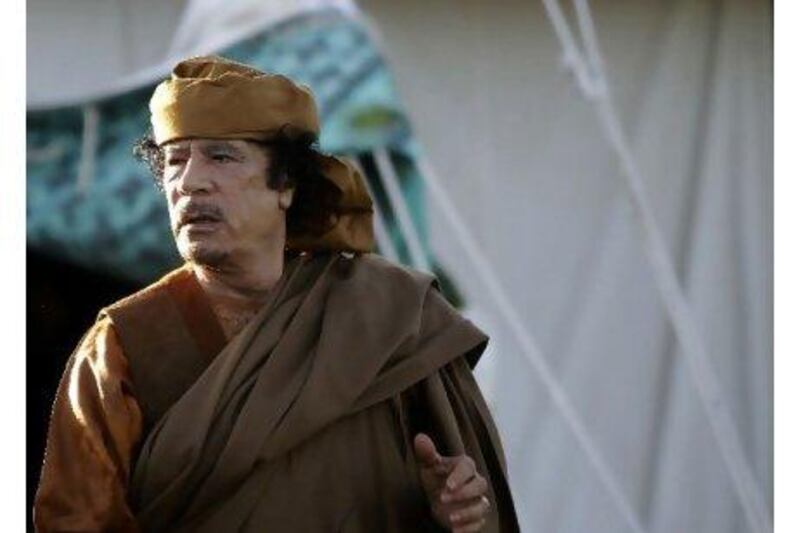DOHA // The president of the International Criminal Court urged Arab states yesterday to join the world's first-ever permanent tribunal to prosecute those responsible for war crimes and crimes against humanity.
Since the court's founding treaty, the Rome Statute, came into force in 2002, 115 countries have joined the court. Only three, however, are Arab states - Jordan, Djibouti and Comoros - and none are members of the Gulf Cooperation Council.
In Doha yesterday, Judge Sang-Hyun Song said it was time for the Arab world to step up its presence in an international institution devoted to bringing to account those responsible for atrocities.
"Most of you come from states that are not party to the Rome Statute", the judge told a roomful of Arab leaders, judges and prosecutors.
"At a time of political upheaval and uncertainty for several countries of this region, what better time to embrace the ICC, an institution that represents justice, security and peace?"
The emir of Qatar insisted that Arab states were keen "to stop all crimes" against humanity. But in his opening address, Sheikh Hamad bin Khalifa Al Thani, said what is needed most is a court that is "not partial to religion" or subject to duplicity. He suggeste that, at present, this was not the case but did not elaborate.
Al Bin Fetais al Marri, the Qatari attorney general, went further: "Between the Arab world and the courts there is a big problem of misunderstanding," Mr al Marri said. "The court needs to go for justice" and not exhibit preferential treatment in which cases to investigate.
"That double standard is not acceptable."
The "double standard" referred to in nearly every speech in Doha yesterday, was what to do regarding Israel and the Palestinian Authority.
The ICC is considering whether the court has the jurisdiction to investigate war crimes allegations against Israel brought by the Palestinian Authority. But delegates yesterday accused the ICC of silence on Israeli aggression in Lebanon and Gaza. The allegations date back to the three-week war between Israel and Hamas in 2008-2008. A spokesman for the court said the question of whether to investigate is tied to the definition of "state".
Ghassan Moukheiber, a member of Lebanon's parliament and chairman of the Arab Region Parliamentarians Against Corruption, said the court should set a precedent by proceeding with an investigation into Israeli war crimes.
"The problem with the ICC, particularly with the Arab world, is it is perceived as being political and biased, and not putting the Arab countries on the same footing as Israel," Mr Moukheiber said.
The events of recent months in the Arab world have injected a new sense of purpose among the ICC's supporters. Egyptian officials are discussing a possible push to join the court, while Tunisia has "adopted a decision on accession to the Rome Statute", Judge Song said.
Opposition to the court's tactics and mandate is not unique to Arab leaders. Legal scholars around the world have complained that the court has focused too narrowly on Africa, and employs overly aggressive tactics that, while morally defensible, make the prosecution of dictators or criminals all the more difficult.
The United States has also refused to join the ICC out of concern that Americans might appear before the court in war crimes cases. Moreover, the US military argues that it has the institutional capability to prosecute crimes by its citizens.
Smaller countries with a lack of domestic legal capacity have nonetheless found comfort in the court's resources. While most crimes are referred to the court by member states, non-member parties can also request court intervention; this is how a recent request reached the ICC prosecutor to investigate alleged post-election crimes in the Ivory Coast.
Despite the initial reservation, legal experts and Arab officials in Doha yesterday acknowledged that expanding the court's membership in the Arab world will continue to be a critical component of increasing the court's mission and drive for global legitimacy.
"It is a lucky coincidence that we are here seeing a renewed interest in the ICC in the Arab world," said Fadi el Abdallah, an ICC legal outreach officer. The interest, he said, is "driven by the situations in Sudan and Libya, where the court is conducting investigations," and from the new governments in the region showing interest, including Tunisia and Egypt.
Indeed, some legal experts yesterday saw it as a positive sign that Qatar hosted a discussion on an international body it has not always agreed with. Two years ago, Qatar refused to arrest the Sudanese president, Omar al Bashir, when he visited for an Arab League summit. And until recently, Qatar cooperated closely with Libyan leader Col Muammar Qaddafi.
"It is striking to me that the very emir that opened the conference today was (in years past) sitting in a summit meeting with Col Qaddafi," Mr Moukheiber, the Lebanese parliamentarian, said.
"It's both ironic and hopeful. Evolution sometimes operates through strange ways. You need mutations for a species to evolve. The same applies in law."





